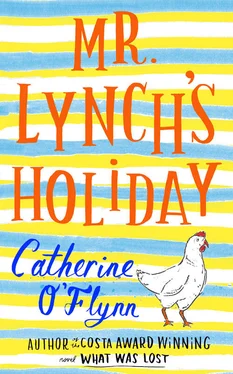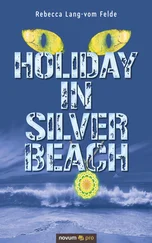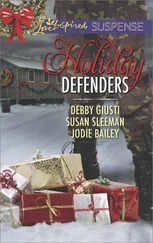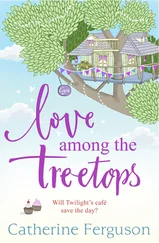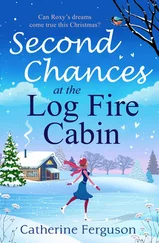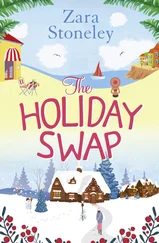‘I’m sorry if I gave you a shock,’ Dermot called through to the kitchen. ‘I thought you’d have got the letter sooner. I didn’t know now the post was so bad.’
Eamonn saw that the arrival had a certain inevitability about it, being just the latest in a long line of unheralded appearances. There were the annual holidays to Ireland where his father would, on a whim, call in on some childhood friend. Though always delighted, those long-ago acquaintances would nevertheless take some time to recover from the sudden appearance at their window of someone they’d last set eyes on forty years previously.
There was a well-worn family anecdote related by his Uncle Joe at any opportunity. Not long after Dermot had moved to England, he took a train up to Liverpool to visit his older brother. Joe’s lot had a flat above a shop back then and he, Tessie and the kids were gathered around the telly when they heard a gentle tapping at the window. Joe drew back the curtain, expecting a bird or a twig, and instead came face to face with his brother. Dermot had tried knocking downstairs, but on getting no answer had gone off scouting for a ladder in nearby entries and back gardens. Tessie had screamed and screamed, even when she saw it was just Dermot. It took several measures of Jameson’s before they could calm her.
Eamonn brought the coffee through to the lounge and sat on a hard chair facing his father.
‘Journey OK, was it?’
‘It was.’
There followed a few minutes’ silence.
‘No hold-ups?’
‘No. Nothing like that.’
Eamonn nodded. ‘That’s good.’ He wanted nothing more than to crawl back into his bed, to finally fall asleep and on waking discover that his father’s arrival had been an unsettling dream. ‘So …’ he was still nodding, ‘is this a holiday, then?’
Dermot seemed surprised at the notion. ‘Maybe it is. I’m not sure. I just thought I’d get away for a while.’
This said as if it were something he had often done. As if he were the type of man who regularly skipped off for foreign mini-breaks.
‘In your letter, you didn’t mention … I mean, you’re welcome to stay as long as you like, but I was just wondering …’
‘What?’
‘The return flight.’
‘What about it?’
Eamonn rubbed the side of his face. ‘When are you going back?’
‘Oh. A fortnight. I thought that was long enough.’
Eamonn let this sink in.
‘I never imagined you travelling abroad.’
Dermot nodded as if agreeing and then said, ‘Spain’s a fascinating place. The different regions and cultures, the separate histories, even separate languages. Of course the Generalisimo tried to do away with all that.’ He paused to take a drink before adding: ‘“Extremadura — Home of the Conquistadores.”’
Eamonn looked at him, waiting to see if there was to be any expansion on this chapter heading, but his father had fallen silent again.
He found his gaze returning to the Aston Villa holdall on the floor between them. Its provenance was mysterious given that his father had no interest at all in football and yet Eamonn had no memory of life before the bag. It had travelled with Dermot every day to the garage, filled with a Thermos of tea, sandwiches, a jumper and whatever library book he happened to be reading. In latter years, when his mother’s health had grown too bad, it had served as his father’s shopping bag. Somehow, despite its many years of service, it was in pristine condition. It was his father’s emblem, the essence of him distilled.
‘And Laura? How’s she now?’
‘She’s OK.’
‘At the shops, is she?’
‘She’s gone away for a few days. A research trip.’
‘Oh. She’ll be back before I leave though, will she?’
‘Maybe. Depends on how the research is going, I suppose.’
‘What is it she’s studying?’
‘Oh … no … she’s not studying. She’s writing. A novel. Historical fiction.’
This last he said in a voice not quite his own, as if he were uncomfortable with the words.
‘A novel! Well that’s something, isn’t it? Why not? They’re all at it. Look at that one. She’s done well out of it, hasn’t she?’
Eamonn nodded, waiting for the inevitable.
‘J. K. Potter, is it? I’d say she has a bob or two by now.’
‘Yes.’
Dermot smiled. ‘You know, your mother used to think you might be a writer? Some idea she had in her head, back when you were young, like. Wrote some story about a dog, I think it was, do you remember?’
‘No.’
‘Ah, you do. A dog that could talk. What was he called?’
‘I’ve no idea.’
‘Patch or Spark. Something like that.’
Eamonn closed his eyes. ‘Flash.’
‘Flash! That was it. Flash the talking dog. The teacher said you had talent too. Your mother thought you’d be the next big thing.’
Eamonn said nothing. He noticed Dermot looking at the array of unwashed dishes lined up along the floor by the patio door. ‘Don’t mind those.’ He stood and started piling them up. ‘Just about to clear up when you came. You know how it is.’
Dermot leaned slightly to the left to see how far the dirty plates extended. ‘Will she mind me being here? You didn’t have any warning.’
‘Laura?’ He dumped the plates on the hatch. ‘She won’t mind at all.’ And it was true, he knew she’d have been delighted to see Dermot.
There was a long silence before his father spoke again.
‘I like to have eggs in the fridge. Your mother liked an egg every day and I can’t eat them like that, but I like to have them handy for the odd occasion when I fancy one. I can go weeks between them.’
Eamonn felt something settle upon him: the discomfiting notion that he was now responsible for his father. Given Dermot’s conversational halts and leaps Eamonn wondered how he could ever hope to distinguish between oblique verbal gambits and full-blown dementia.
‘The thing is, they have the dates, don’t they?’
‘Sorry?’
‘The expiry. So the box will sit there with five eggs in for weeks and then one morning I’ll notice that I have two days left to eat the lot of them and I do it. Scrambled, poached, fried, whatever you like. I get through them all!’
Eamonn thought the sermon on the egg had come to an end, but after a few moments’ silence Dermot turned to him and concluded:
‘The expiry dates. They’re great things.’
He looked back at Eamonn’s block, identical to all the others around it. ‘Do you have many there in the maisonette with you?’
‘It’s not a maisonette. It’s not Castle Vale.’
‘What do you call it, then?’
‘I don’t know. Apartment block. It doesn’t matter.’
He remembered this habit of Eamonn’s: correcting what you said, but irritated when you asked for the right way to say it. ‘So, are there many others in there with you?’
Eamonn mumbled an answer he couldn’t catch.
As they walked down the road he thought that Lomaverde didn’t in fact look that different to the low-rise parts of the Castle Vale estate. Or at least Castle Vale when it first went up in the 60s. All very spick and span and modern. Eamonn, he was sure, wouldn’t appreciate the comparison. He could be very grand at times. After university he’d come back to live with them for a few months, rising at eleven, taking a good hour over his breakfast, his newspaper spread out all over the table, the radio switched from Jimmy Young to Radio 4. Kathleen would wait on him attentively, spending a fortune on the inedible-looking muesli he favoured. ‘The English Gentleman,’ Dermot would say to Kathleen. ‘To the manor born.’
They walked in silence, keeping to the pavement, though there were no cars to be seen or heard. Junk mail was visible sticking out from every letter box, flyers for mobile phones and estate agents lay inert, here and there, on the street, unhurried by any breeze. He stopped to appreciate the heat of the day. He stretched out his fingers as if in the bath. It was bad for you apparently. That was the latest thing. Even the sun. He considered taking his jacket off.
Читать дальше
